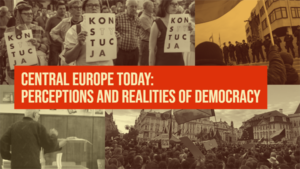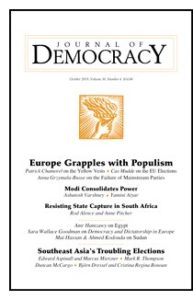Participation without populism is one of three practical solutions to the core challenges facing democracies in the West, according to Nicolas Berggruen and Nathan Gardels, co-authors of “Renovating Democracy: Governing in the Age of Globalization and Digital Capitalism,” the Brookings Institution reports:
- To allow for participation without populism, the authors recommend integrating social networks and direct democracy with institutions that mediate and foster consensus.
- Changing the narrative from “redistribution” of wealth, the authors argue for “predistribution” in an effort to improve the skillset and assets of those less affluent.
- The authors advocate for positive nationalism at home while supporting cooperation across the globe. They emphasized that Western countries do not need to abandon established institutions, only “renovate” within existing frameworks.
 Is populism in Central and Eastern Europe finally losing its momentum? In Poland, opposition parties won the Senate, and the ruling Law and Justice (PiS) party’s share of the vote slipped to 43.7%, from 45.5% in European Parliament elections this past May, notes Slawomir Sierakowski, founder of the Krytyka Polityczna movement, Director of the Institute for Advanced Study in Warsaw and a fellow at the Robert Bosch Academy in Berlin.
Is populism in Central and Eastern Europe finally losing its momentum? In Poland, opposition parties won the Senate, and the ruling Law and Justice (PiS) party’s share of the vote slipped to 43.7%, from 45.5% in European Parliament elections this past May, notes Slawomir Sierakowski, founder of the Krytyka Polityczna movement, Director of the Institute for Advanced Study in Warsaw and a fellow at the Robert Bosch Academy in Berlin.
And in Hungary’s local elections, the opposition retook power in Budapest and won mayoral races in ten other cities. The question now is whether these results augur a broader political shift in the region, he writes for New Europe:.
One could look at Central and Eastern Europe as a source of disappointment, given that populists are still getting elected and re-elected. Yet, unlike in autocracies elsewhere, the region’s populists can still lose. Following Slovakian President Zuzana Čaputová’s election earlier this year, the PiS’s loss of the Senate and the Hungarian opposition’s strong performance in major cities show that liberal democracy has yet to be snuffed out.
 As Europe grapples with populism, how are the deeper dynamics of national and EU politics changing? The NED’s Journal of Democracy asks.
As Europe grapples with populism, how are the deeper dynamics of national and EU politics changing? The NED’s Journal of Democracy asks.
- Anna Grzymala-Busse analyzes the role of mainstream-party failures in the rise of European populism;
- Patrick Chamorel reflects on the growing class, cultural, and geographic divisions revealed by France’s Yellow Vest protest movement;
- Assessing the 2019 EU elections, Cas Mudde argues that the framing of immigration since 2015 has shifted the center of political debate.
In The Far Right Today, Mudde gives an accessible account of the history and ideology of the far right as we know it today, as well as the causes and consequences of its mobilization, analyst Katherine Williams observes.
 As scholars in the field well know, there is no consensus between academics when it comes to terminology, but most agree that the ‘far right’ is an umbrella term that encompasses the broader subgroups of the radical right and extreme right. In a nutshell, the differences between the two concern their attitude to democracy, she writes for the LSE Review of Books: the former operates within democratic institutions, and the latter, quite simply, does not. Mudde provides readers with a series of examples that contextualise these distinctions, and touches upon another term that has found a foothold in contemporary political debate: populism.
As scholars in the field well know, there is no consensus between academics when it comes to terminology, but most agree that the ‘far right’ is an umbrella term that encompasses the broader subgroups of the radical right and extreme right. In a nutshell, the differences between the two concern their attitude to democracy, she writes for the LSE Review of Books: the former operates within democratic institutions, and the latter, quite simply, does not. Mudde provides readers with a series of examples that contextualise these distinctions, and touches upon another term that has found a foothold in contemporary political debate: populism.
Foreign Policy’s latest issue explores how populism could shape U.S. democracy, and more.
In the New York Times, analyst Maria Schmidt makes The Case for Populism, while Lukas Kaelin and Benjamin Kaelin pose the question, Are Populists Unusually Prone to Political Blunders? in Foreign Affairs.







